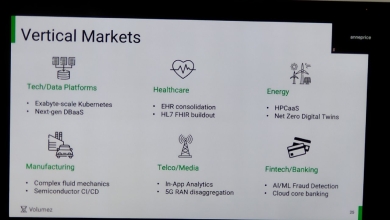
Volumez, a new data storage orchestration platform, is extending its market reach.
It recently completed a $20m Series A funding round, and uses Linux software to “quickly execute modern data infrastructure workloads” across on-premise and multi-cloud environments.
Companies can specify their block storage capacity, performance, resilience and security needs, and Volumez’s software orchestrates the storage using cost-effective Linux technology.
Volumez has added Microsoft Azure cloud support to its existing Amazon Web Services capabilities, and cloud data services player InterSystems is now using the technology to look after the data analytics workloads of its clients through its IRIS public cloud database.
CEO Amir Faintuch told the recent IT Press Tour in the US - which IT Europa attended – “This is a SaaS-based service that sees deployments worth between hundreds and thousands of dollars per month, depending on the size of the company.”
Asked whether the public cloud companies could offer the same service. Faintuch said: “They could, but it is not a priority for them as they are already making plenty from large customers, and we have a three-year start before coming out of stealth-mode earlier this year – our IP is in our orchestration.”
"As controller orchestration and cloud-native data infrastructure become the gold standard for cloud-based deployments, InterSystems looks forward to integrating Volumez controller orchestration with our IRIS data platform, to unlock new levels of agility and efficiency," said Scott Gnau, head of data platforms at InterSystems.
"The integration will allow us to deliver a fully managed and high-performance database-as-a-service, seamlessly integrating AI functionalities within the IRIS kernel.”
Volumez is a company that claims to be leading the market, by targeting a portion of the public cloud data storage segment where customers are starting to realise that going all-in with what the cloud supplier is offering, by way of a full data service suite, can be expensive. It will be interesting to see how the cloud data orchestration space develops.
